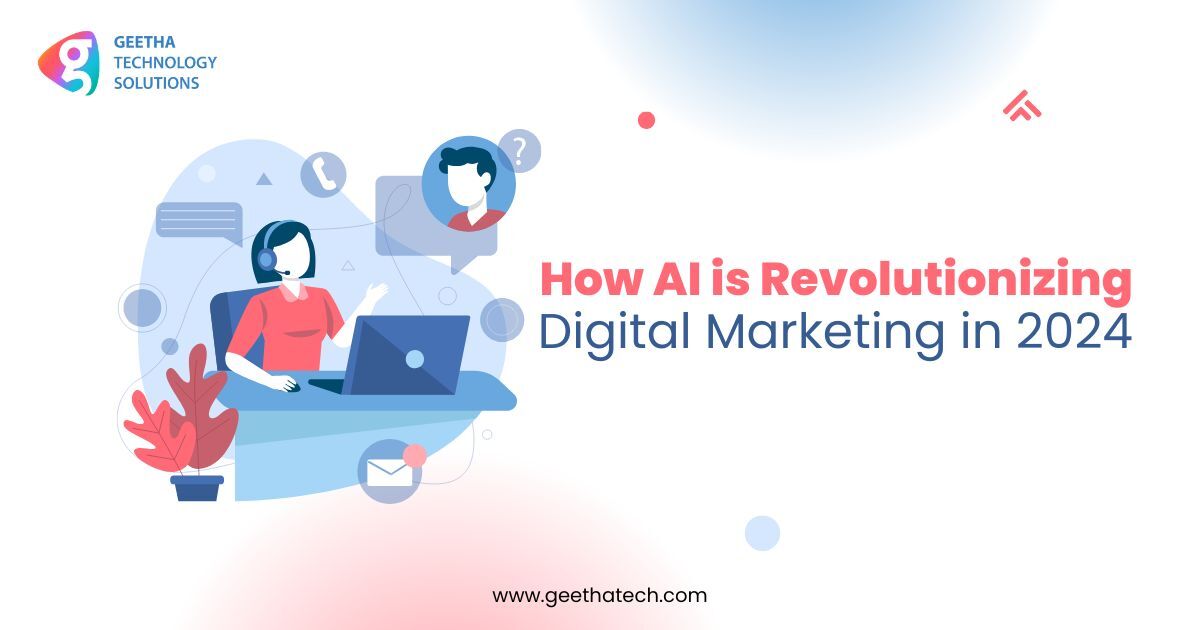
Artificial Intelligence (AI) is reshaping the digital marketing landscape in profound ways, transforming how businesses engage with customers, optimize strategies, and measure success. In 2024, AI is more than a trend—it's a necessity for staying competitive in an ever-evolving digital world. Here's a closer look at how AI is revolutionizing digital marketing across key areas:
1. Hyper-Personalized Customer Experiences
AI enables brands to deliver personalized experiences by analyzing vast amounts of data. Algorithms can predict user behavior, preferences, and purchase patterns, allowing marketers to create tailored content, offers, and recommendations.
Example:
Platforms like Amazon and Netflix use AI to suggest products or content based on past interactions, driving engagement and boosting sales. In 2024, even smaller businesses are leveraging AI-driven personalization to enhance user experiences.
Impact:
- Increased conversion rates through tailored marketing.
- Enhanced customer loyalty due to relevant, timely content.
2. AI-Powered Content Creation and Optimization
Content is still king, but AI tools are the new royal advisors. AI assists in generating blog posts, ad copy, social media content, and even video scripts. Tools like ChatGPT and Jasper AI help marketers produce high-quality content faster, while platforms like Grammarly optimize it for readability and tone.
Advanced Applications:
- Dynamic Content: AI can adjust website content in real-time based on user behavior.
- SEO Optimization: AI-driven tools analyze search intent and keywords to help create content that ranks higher.
3. Automation in Advertising
AI has revolutionized digital advertising by optimizing ad placements, bidding strategies, and audience targeting. Platforms like Google Ads and Facebook Ads utilize AI to analyze user data, ensuring ads reach the right audience at the right time.
Key Innovations in 2024:
- Predictive Analytics: AI forecasts campaign performance, allowing marketers to adjust strategies proactively.
- Programmatic Advertising: Automated ad buying ensures efficient budget allocation and better ROI.
4. Advanced Chatbots and Conversational AI
AI-powered chatbots are now essential for customer service and lead generation. In 2024, these bots are more conversational, context-aware, and capable of handling complex queries. They provide instant responses, gather customer data, and guide users through the buyer’s journey.
Notable Features:
- 24/7 Availability: Ensures constant customer support without human intervention.
- Multilingual Support: Breaks language barriers, enhancing global customer engagement.
5. Enhanced Data Analytics and Insights
AI-driven analytics tools process vast amounts of data to uncover actionable insights. In 2024, AI is helping marketers understand customer journeys, predict trends, and optimize campaigns with unprecedented accuracy.
Examples:
- Sentiment Analysis: AI analyzes social media conversations to gauge public sentiment about brands or campaigns.
- Predictive Modelling: Forecasting future behaviors based on historical data to refine marketing strategies.
6. Voice Search and Visual Recognition
With the rise of smart assistants like Alexa and Google Assistant, optimizing for voice search is crucial. AI also powers visual recognition, enabling features like Google Lens, where users search via images rather than text.
Implications for Marketers:
- Voice Search Optimization: Adapting SEO strategies for voice queries, focusing on conversational keywords.
- Visual Commerce: AI recognizes products in images, linking users to purchasing options directly.
7. AI in Email Marketing
AI is redefining email marketing by enabling dynamic personalization, predictive send times, and automated content curation. Emails are no longer generic—they're tailored to individual recipients, enhancing open and click-through rates.
Innovations Include:
- Subject Line Optimization: AI predicts which subject lines will drive the most engagement.
- Content Segmentation: Automatically curates content based on user preferences and interactions.
Challenges and Ethical Considerations
While AI offers numerous benefits, it also raises challenges:
- Data Privacy: Ensuring compliance with regulations like GDPR while using AI for data analysis.
- Bias in Algorithms: Avoiding biases in AI systems that could affect targeting and personalization.
- Job Displacement: Balancing automation with human oversight to maintain employment opportunities.
In 2024, AI is not just enhancing digital marketing—it’s transforming it. By automating routine tasks, delivering personalized experiences, and providing deeper insights, AI empowers marketers to focus on creativity and strategy. As AI technology continues to evolve, businesses that embrace its potential will gain a competitive edge, unlocking new levels of engagement, efficiency, and success.
Also read: How AI is Changing the Landscape of Content Marketing
Embrace the AI revolution today to future-proof your marketing strategies!

